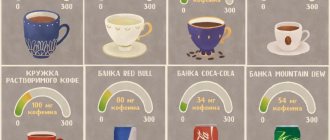Some people cannot imagine the morning without a cup of coffee. This drink energizes, helps to cheer up and improves performance. At the same time, almost no one thinks about how coffee affects the blood vessels of the brain and other vital organs. If used frequently, it can cause serious harm, especially in cases of heart disease.
The mechanism of action of caffeine on the vascular system
The caffeine contained in coffee affects the blood vessels of the brain in different ways. As a rule, it promotes their expansion, but in some systems, for example, digestion and the central nervous system, capillaries contract under its influence.
This is explained by the stimulating effect of the substance: in order for the cardiovascular system and nerve centers to be activated, blood flow in most internal organs is reduced. Reducing the permeability of capillary walls promotes the excitation of neurons in the brain and because of this, drowsiness disappears.
Drinking large amounts of the drink contributes to the accumulation of caffeine in the body. It weakens the effect of adenosine, a substance that inhibits the transmission of nerve impulses. As a result, the brain is activated and ceases to feel the need for rest.
Caffeine stimulates the production of hormones, including adrenaline. Its action is familiar to everyone:
- The pulse quickens;
- Respiration rate increases;
- Pupils dilate;
- I feel a surge of strength.
This hormone stimulates the functioning of the cardiovascular system: the heart begins to contract more often, small vessels narrow, and blood pressure rises. Therefore, coffee and other caffeine-containing drinks are prohibited for myocardial diseases.
Viscosity
The effect of coffee varies depending on the additives to it (Photo: pixabay.com)
Coffee can be different: high quality and not so good. If you use grain or high-quality instant, you don’t have to worry about its effect on blood viscosity. The drink does not make the blood either thick or thin, that is, it is a mistake to perceive it as a remedy for blood clots or, on the contrary, to be afraid of its thickening effect.
But all this applies only to a high-quality drink in its pure form. Changing its composition also makes adjustments in its effect on the body. Cheap instant “powders” are made from more than just coffee beans. They add flavorings for taste, impurities of plant and chemical origin for color, and preservatives to increase shelf life. All this chemical waste, regularly entering the body, contributes to the accumulation of toxins in the blood and disrupts the functioning of the body’s cleansing system: the liver and kidneys. Failures in the operation of our “filters” invariably lead to disturbances in the composition and thickness of the blood.
Coffee saturated with sugar and fat has a less aggressive, but still noticeable effect. If you are used to adding a lot of refined sugar, cream or full-fat milk to it, and also eating it with sweet desserts, rest assured that your body regularly increases glucose levels, which makes the blood thicker. And an increase in cholesterol levels thickens it and provokes the development of heart disease.
The effect of caffeine on blood vessels
The effect of coffee on the blood vessels of the brain is controversial. On the one hand, it activates its work, increases its ability to work, and stimulates brain activity. On the other hand, a strong spasm of small vessels can provoke hemorrhage.
This is explained by the fact that, under the influence of negative factors, the tissue walls wear out over time and become fragile.
Stimulation of nerve centers affects the functioning of the brain:
- The need for oxygen is reduced;
- Metabolic processes take place at an accelerated pace;
- The work of the central nervous system departments improves;
- Drowsiness disappears.
Caffeine significantly affects the functioning of the subcortical structures of the brain, which affects the functioning of the entire body. Under its action, the autonomic nerve centers of the brain stem are activated, which are responsible for breathing, heartbeat, and the endocrine system.
In the absence of serious diseases, it has a positive effect on the functioning of the circulatory system of the brain.
There is an opinion that moderate consumption of coffee reduces the risk of heart attack and angina, due to the fact that in this way the circulatory organs “train”, their resistance to stress increases, and blood circulation is normalized in distant systems.
There is also a dilation of the main vessels - the coronary arteries, through which oxygenated blood flows first to the heart and then to other parts of the body. Accordingly, much more nutrients are delivered to them.
Safe daily dose of drink
Due to an unhealthy lifestyle and non-compliance with a balanced diet, people develop diseases of the vascular system such as atherosclerosis and vegetative-vascular dystonia.
Over time, arteries and thin vessels accumulate fatty particles on their walls due to eating fast food, fatty meats, sweets, fried foods, etc. Therefore, already at 35-40 years old, patients experience atherosclerosis. The disease affects the brain, cardiac system, and legs. Coffee also has a negative effect on such patients; it promotes the formation of cholesterol due to the component that is included in its composition - cafestol.
With vegetative-vascular dystonia, drinking espresso can even be useful when the pathology is manifested by low blood pressure. If the pressure readings are normal, then espresso does not affect its readings at all. Doctors do not recommend drinking grain coffee if VSD is present in hypertensive patients. There are risks of pressure surges and other unpleasant consequences.
Israeli scientists conducted an experiment to study the effect of caffeine on blood pressure. The study revealed that a single dose of 200 mg of the substance (equal to double espresso) causes an increase in readings by 4-6 mm Hg. Art. only in people with diseases of the cardiovascular system.
Damage to the body caused by caffeine appears after prolonged consumption of more than five cups of coffee per day and is characterized by:
- Frequent headaches in the forehead or back of the head. The localization of the pain syndrome is associated with the level of blood pressure.
- Insomnia. The general nervous state is caused by the exhaustion of adaptation systems. The body is able to compensate for the constant stimulation of functions in the nervous system for a long time. However, prolonged wakefulness with increased mental and physical stress is accompanied by the accumulation of toxic metabolites. At the same time, the problem of chronic fatigue is associated with depletion of the depot of essential nutrients and biologically active substances.
- Periodic disruption of blood transport through the coronary vessels (accompanied by a disorder of the contractile and conductive functions of the heart). The automaticity of synthesis and conduction of impulses is ensured by the isolated structure of nerve nodes and fibers that are affected by myocardial pathologies. Arrhythmia (disturbance in the normal rhythm of the heart), manifested by atrial fibrillation, the appearance of extrasystoles (extraordinary contractions) and blockades, is a sign of chronic coffee abuse.
In addition, caffeine is one of the stimulant substances that can cause addiction. If coffee is consumed by people with a habit, their general condition improves, while in abstinence (abstinence) they experience symptoms of headache, nausea and fatigue.
Drinking coffee can be dangerous because it can lead to addiction. In order to understand if it is, you should give up the drink for a while, as well as everything that contains caffeine.
If you have an addiction, you may experience the following symptoms:
- constant headaches;
- feeling drowsy and tired;
- the person becomes irritable and easily excited;
- bad mood, depression;
- nausea;
- unpleasant sensation in the muscle area.
You may have all or some of the symptoms listed above. After getting used to coffee, its tonic effect begins to decrease, just as in the case of drugs, an increasingly larger dosage is required. Moreover, the more you drink it, the more difficult it will be to give up later.
The photo below is an example of how coffee beans should look.
Coffee also reduces the brain's need for oxygen. This improves the functioning of cortical and subcortical structures, but at the same time drowsiness may occur when caffeine is completely eliminated from the body (after 2 to 7 hours). But right away, on the contrary, the desire to sleep decreases. But this effect lasts only the first hour. So a few hours before bed, caffeine will in no way affect your ability to fall asleep quickly.
Caffeine has a tonic, invigorating effect, like most other alkaloids that make up coffee.
The following effects can also be noted:
- Increased taste sensitivity and charm. However, this effect does not occur in people who smoke, since nicotine and fumes make the receptors less sensitive.
- Improvement of intellectual abilities. Caffeine reduces the need for oxygen and has a stimulating effect on nerve cells (thereby improving impulse transmission).
- Improves overall mood. After all, coffee contains a whole range of alkaloids, many of which act as psychostimulants (but the effect is thousands of times weaker than that of synthetic drugs).
It is more correct to indicate the daily intake not of coffee, but of the caffeine it contains. How much is there in a regular cup of hot drink?
You can focus on the following numbers:
- soluble - from 60 to 100 milligrams (at the rate of 2 teaspoons of granules);
- espresso – from 80 to 130 milligrams;
- cappuccino (lattes and other similar drinks) – from 40 to 70 milligrams;
- natural boiled (in the traditional way in Turk) - from 110 to 170 milligrams.
The optimal daily intake is up to 200 milligrams of caffeine, that is, 2 regular cups of coffee. The permissible maximum is 400 milligrams.
If it is more, it will harm the heart, as there will be an excessive load on it. For children under 14 years of age, coffee drinks in any form are generally not recommended (this also applies to pharmacological preparations that contain caffeine).
In theory, if you follow these recommendations, there will be no negative consequences from drinking coffee. This has been confirmed by many years of research (when scientists wanted to find out whether the life expectancy of those who prefer tea and those who drink only coffee changes).
It is undesirable to drink drinks containing caffeine if you have hypertension. Contraindications also include:
- period of breastfeeding and gestation;
- childhood and adolescence;
- glaucoma;
- aneurysm;
- disturbance of blood flow in the myocardium;
- degenerative processes in the cranial region;
- angina pectoris.
In addition, you should limit your coffee consumption if you have psychological disorders and insomnia.
Caffeine has a constricting and dilating effect on arteries and capillaries. With moderate consumption of drinks based on it, the body is more likely to benefit. If abused, serious harm can occur. Therefore, you should not drink more than three servings of aromatic espresso per day.
The article provides information about the effect of coffee on blood vessels. You will also find out whether doctors allow drinking espresso for varicose veins, what doses of coffee are recommended for healthy people and who should not drink it.
Nowadays there are often people who have problems with the cardiovascular system. After forty years, many people experience pressure surges. If a patient develops hypertension, doctors do not recommend drinking coffee. At low pressure, espresso can bring a person to his senses. But we will not only talk about pressure indicators and the influence of strong espresso on them; then we will study in detail the topic of coffee and vessels. Let's find out how coffee affects human blood vessels, and whether it is possible to drink the drink if you have varicose veins.
Vasodilation
Coffee has a dilating effect on the supporting blood vessels - arteries. This can be clearly seen in the work of some organs:
- Heart. An increase in heart rate and, accordingly, acceleration of blood pumping through the organ leads to the saturation of its tissues with nutrients. Thus, its resistance to negative influences increases - for the smooth functioning of any muscles, training is needed.
- Muscle. The flow of blood to this body structure helps to strengthen it and speed up the metabolism in its cells. Decay products begin to be intensively removed from the body, and it begins to be intensively cleansed.
- Kidneys. Coffee has a diuretic effect. Blood circulation improves in them, their activity is activated. This normalizes the functioning of the excretory system.
- Lungs. Stimulation of the nerve centers responsible for the functioning of the respiratory organs activates their work. This promotes active saturation of the blood with oxygen. In addition, by taking a deep breath, a person can get rid of congestion in the lower parts of the lungs.
Effect on blood pressure
Since the drink has a dilating effect on blood vessels, immediately after drinking it, the pressure increases in both hypertensive and hypotensive patients. That is why patients suffering from high blood pressure are not recommended to abuse the drink, as this can cause a hypertensive crisis.
Failure to follow this recommendation often leads to headaches and increased stress on blood vessels.
Patients suffering from vascular pathologies need to know that the drink increases upper blood pressure by 5-12 mmHg. Art., and the lower one - by 5-6 mm Hg. Art. The effect lasts for 3-4 hours.
If a person regularly drinks large amounts of coffee and is “dependent” on the drink (and it can be addictive), then the increase in blood pressure will be insignificant or completely absent.
Vasoconstriction
Some blood vessels, on the contrary, narrow under the influence of coffee. For example, under its influence, blood flow in the following organs decreases:
- Gastrointestinal tract. Substances contained in coffee irritate the gastric mucosa. This leads to increased secretion of gastric juice and faster digestion. Caffeine increases intestinal sensitivities.
- Pelvic organs. Due to spasm of the walls of small blood vessels, susceptibility to pain is reduced.
- CNS. In the brain, capillaries narrow. In addition to the positive effect, this can cause nervous exhaustion.
Benefits of caffeine for the brain
Accelerating chemical reactions stimulates the functioning of the brain due to the rapid transmission of nerve impulses between its cells. This contributes to:
- Improving the quality of mental activity;
- Increased blood pressure with hypotension;
- Acceleration of intercellular metabolism;
- Prevention of the development of coronary disease;
- Normalization of hormone secretion by the glands of the brain.
Coffee contains a large amount of antioxidants - substances that prevent tissue oxidation. Aging is inhibited and the risk of tumors is reduced.
Who should avoid drinking coffee?
In large quantities, the drink can be harmful, especially in the presence of certain chronic diseases. Therefore it is contraindicated:
- For diseases of the central nervous system, heart;
- Pregnant and lactating women;
- For diseases of the circulatory system: atherosclerosis, vegetative-vascular dystonia;
- For gastrointestinal diseases: ulcers, gastritis;
- For pathologies of the urinary system;
- For eye diseases: glaucoma.
The effects of caffeine on the body are poorly understood. Do not give strong drink to children under 14 years of age.
How much is coffee without harm?
When it comes to coffee, benefits and harms go hand in hand. Its consumption in large quantities can cause exacerbation of chronic diseases and provoke problems with the circulatory system and internal organs. Therefore, experts recommend that a healthy person drink no more than 4 cups a day.
Some rules for drinking the drink will help reduce the negative effects of caffeine:
- Avoid its use if you have heart disease;
- Give preference to a quality product: instead of instant coffee, brew ground coffee;
- You should not drink it on an empty stomach.
After a cup of coffee you feel a surge of strength and vigor. But you shouldn’t get carried away with it: excessive consumption leads to physical and nervous exhaustion.
When not to drink coffee
Despite the fact that coffee is not a medicine, its effect on the heart and blood vessels is very significant. Therefore, there are a number of contraindications for drinking this drink:
| Absolutely exclude | Limit to 1–2 cups per day |
| Children under 12 years old | Children from 12 to 18 years old |
| Pregnancy in the 1st trimester | Pregnancy in the 2nd–3rd trimester |
| Lactation | Tendency to increase blood pressure (upper – from 140 mm Hg, lower – from 90 mm Hg) |
| Hypertonic disease | Insomnia |
| Acute forms of blood flow disorders in the heart muscle and brain | Nervous overexcitement |
| Heart rhythm disturbances such as tachyarrhythmia | Mental illness with severe agitation (psychosis) |
| Impaired kidney function with large urine output (oliguria) | |
| High blood sodium | |
| Ulcerative lesions of the stomach and intestines during exacerbation | |
| Pathological dilatation of blood vessels (aneurysm) of any location | |
| Old age (more than 75–80 years) | |
| Severe atherosclerotic changes in arterial vessels | |
| Early postoperative period (7–10 days) after any surgical procedures on the heart, blood vessels and brain | |
| Traumatic brain injury | |
| Glaucoma (increased pressure inside the eye) |











